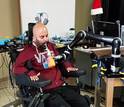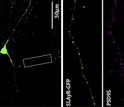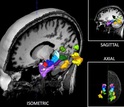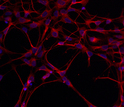News Release 15-088
Bold new brain research in neuroengineering, brain-inspired design, and individuality
$13.1 million for 16 new awards part of NSF's support for integrative, fundamental brain research and the BRAIN Initiative
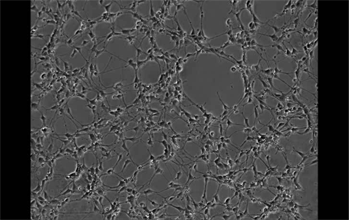
One project will develop a theory of how single neural cells form electrically active networks.
August 12, 2015
This material is available primarily for archival purposes. Telephone numbers or other contact information may be out of date; please see current contact information at media contacts.
How does sleep affect individual memories? How do brain cells connect to form meaningful networks? How is a word like "chair" conceptualized in the mind?
To support potentially transformative research in neural and cognitive systems, the National Science Foundation (NSF) has awarded 16 grants to multidisciplinary teams from across the United States.
Each award brings together scientists and engineers from diverse fields to investigate brain-related mysteries. The awards fall within two themes: neuroengineering and brain-inspired concepts and designs, and individuality and variation. Each provides up to $1 million over two to four years.
"These new projects will explore big, exciting ideas in neuroscience to push hard against the boundaries of what we know," said Betty Tuller, NSF program director in the Social, Behavioral and Economic Sciences Directorate, who will help oversee the awards.
Understanding the brain
The awards stem from the cross-disciplinary NSF Integrative Strategies for Understanding Neural and Cognitive Systems program, which supports innovative, integrative, boundary-crossing approaches necessary to advance brain science. They are the result of the program’s first solicitation for research proposals, released in fall 2014.
"These teams are building on creative ideas from within and beyond neuroscience," said Kenneth Whang, NSF program director in the Computer & Information Science & Engineering Directorate, which co-funds the awards. "We're seeing some dynamic new research collaborations that will have huge impacts on fundamental questions, and on what we can discover or invent in the future."
The NSF directorates for Engineering and for Education and Human Resources also support the awards. NSF will announce new research themes soon, along with a call for new proposals.
These new awards will contribute to NSF’s significant investments in support of the BRAIN Initiative, a coordinated research effort that seeks to accelerate the development of new neurotechnologies that promise to help researchers answer fundamental questions about how the brain works.
The principal investigators for the new awards are as follows:
Neuroengineering and brain-inspired concepts and design
- Amina Qutub of Rice University, Identifying design principles of neural cells
- Sydney Cash of Massachusetts General Hospital and Nian Sun of Northeastern University, Nanomagnetic Stimulation Capability for Neural Investigation and Control
- Rajesh Menon of University of Utah, Imaging synaptic activity deep in the brain using super-resolution cannula microscopy
- Behnaam Aazhang of Rice University and Nitin Tandon of University of Texas HSC Houston, Micro-scale real-time decoding and closed-loop modulation of human language
- Charles Gilbert of Rockefeller University, A circuit theory of cortical function
- Richard Andersen of California Institute of Technology, Charles Liu of University of Southern California, and Kapil Katyal of Johns Hopkins University, Research in cognitive neuroengineering
- Yiyang Gong of Duke University, Real-time optical readout and control of population neural activity with cellular resolution
- Aude Oliva of MIT, Algorithmically explicit neural representation of visual memorability
Individuality and variation
- Steven Chase of Carnegie Mellon University, The structure of neural variability during motor learning
- Joshua Gold of University of Pennsylvania, The role of noise in mental exploration for learning
- David Warren of University of Utah, Sensory-motor integration via recording and stimulating arm nerves
- Kenneth Norman of Princeton University and Ken Paller of Northwestern University, Sleep's role in determining the fate of individual memories
- Jose Contreras-Vidal of University of Houston, Assaying neural individuality and variation in freely behaving people based on qEEG
- Ping Li of The Pennsylvania State University, Reading in the brain: Integrative approaches toward first and second language comprehension
- Hava Siegelmann of University of Massachusetts Amherst and Lilianne Mujica-Parodi of SUNY Stony Brook, Individual variability in human brain connectivity, modeled using multi-scale dynamics under energy constraints
- Zhong-Lin Lu of Ohio State University and Mark Steyvers of University of California, Irvine, Understanding individual differences in cognitive performance: Joint hierarchical Bayesian modeling of behavioral and neuroimaging data
-NSF-
-
Research will generate a new approach to using brain signals to control intelligent robotic systems.
Credit and Larger Version -
An elegant, inexpensive new tool is intended to look at the junctions between neurons.
Credit and Larger Version -
Recording brain activity before and during sleep can help researchers understand memory formation.
Credit and Larger Version -
A team of investigators will develop an algorithm that may help predict what people will remember.
Credit and Larger Version -
How the structure of neural networks relates to their function is an important unsolved mystery.
Credit and Larger Version
Media Contacts
Sarah Bates, NSF, (703) 292-7738, email: sabates@nsf.gov
Program Contacts
Kenneth Whang, NSF, (703) 292-5149, email: kwhang@nsf.gov
Betty K. Tuller, NSF, (703) 292-7238, email: btuller@nsf.gov
Related Websites
NSF Understanding the Brain: nsf.gov/brain
Brain power: Bright ideas and smart tools for neuroengineering: nsf.gov/brainpower
The U.S. National Science Foundation propels the nation forward by advancing fundamental research in all fields of science and engineering. NSF supports research and people by providing facilities, instruments and funding to support their ingenuity and sustain the U.S. as a global leader in research and innovation. With a fiscal year 2023 budget of $9.5 billion, NSF funds reach all 50 states through grants to nearly 2,000 colleges, universities and institutions. Each year, NSF receives more than 40,000 competitive proposals and makes about 11,000 new awards. Those awards include support for cooperative research with industry, Arctic and Antarctic research and operations, and U.S. participation in international scientific efforts.
Connect with us online
NSF website: nsf.gov
NSF News: nsf.gov/news
For News Media: nsf.gov/news/newsroom
Statistics: nsf.gov/statistics/
Awards database: nsf.gov/awardsearch/
Follow us on social
Twitter: twitter.com/NSF
Facebook: facebook.com/US.NSF
Instagram: instagram.com/nsfgov



